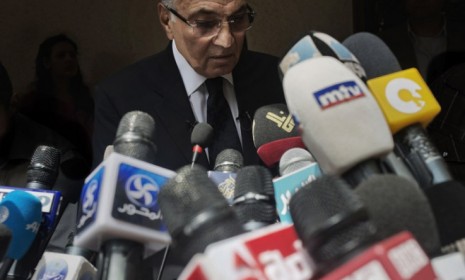Egypt's presidential run-off: The end of the revolution?
After the first round of voting, the pro-democracy forces behind last year's uprising will have to watch as either an Islamist or a Mubarak deputy takes power

Protesters flooded into the streets of Cairo and other Egyptian cities on Monday, after election officials confirmed that Ahmed Shafiq, the last prime minister under ousted longtime leader Hosni Mubarak, had won a spot in a June run-off election for the presidency. Shafiq, whose headquarters was ransacked and set on fire by angry crowds, will face the top vote-getter, Mohammed Mursi of the Muslim Brotherhood. Many Egyptians were furious that someone from Mubarak's regime could have a shot at leading the country after a popular uprising pushed Mubarak aside after decades in power. Has Egypt's first free and fair presidential election turned into a disaster for the revolution?
This may spell the end of the revolution: This is "absolutely not what the protesters in Tahrir Square" intended when they toppled Mubarak last year, says the United Arab Emirates' Gulf News in an editorial. Egyptians put their lives on the line so they could have a secular democracy. Now they'll have to choose between candidates with "diametrically opposed authoritarian and religious visions of Egypt's future." No matter who wins, the revolution loses.
The Week
Escape your echo chamber. Get the facts behind the news, plus analysis from multiple perspectives.

Sign up for The Week's Free Newsletters
From our morning news briefing to a weekly Good News Newsletter, get the best of The Week delivered directly to your inbox.
From our morning news briefing to a weekly Good News Newsletter, get the best of The Week delivered directly to your inbox.
This is disappointing, but predictable: The first round produced "the worst of all the possible run-off combinations," says Marc Lynch at Foreign Policy. But that shouldn't be a surprise. Islamists and the authoritarian old guard were bound to benefit when the revolutionary center split apart and failed to unite behind a single candidate. So now, with no chance of electing a truly legitimate president, Egyptians will just have to focus on reestablishing civilian rule and drafting an "acceptable constitution."
Hold on. The election still represents progress: "It's too early to say that Egypt's presidential election has redeemed the promise of last year's popular uprising," says the Los Angeles Times in an editorial. Still, it was a step in the right direction. Choosing between someone from the old order promising stability and someone promising Islamic law certainly offers Egyptians a "stark choice," but at least they "are practicing the democracy that was preached" in Tahrir Square, which is a historic achievement.
A free daily email with the biggest news stories of the day – and the best features from TheWeek.com
-
 Bad Bunny, Lamar, K-pop make Grammy history
Bad Bunny, Lamar, K-pop make Grammy historySpeed Read The Puerto Rican artist will perform at the Super Bowl this weekend
-
 Political cartoons for February 2
Political cartoons for February 2Cartoons Monday’s political cartoons include ICE getting schooled, AI in control, and more
-
 Democrats win House race, flip Texas Senate seat
Democrats win House race, flip Texas Senate seatSpeed Read Christian Menefee won the special election for an open House seat in the Houston area